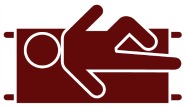Why are Emergency Rooms so crowded? Slate Magazine gathers the most recent data and shows that the uninsured are no more likely to use Emergency care for nonemergent conditions any more than the insured. Instead, patients are going to the ED to get answers they can't get from their doctor's office. "E.R.s have become one-stop shops, assuming that you're willing to lie on a foam stretcher in a hallway for eight hours."
see a doctor and know one way or another what is going on. That's no
longer the case in the outpatient doctor world.
The problem is that this story of the healthy, cavalier, uninsured E.R. abuser is largely a myth. E.R. use by the uninsured is not wrecking health care. In fact, the uninsured don't even use the E.R. any more often than those with insurance do. And now, a new study shows that the increased use of the E.R. over the past decade (119 million U.S. visits in 2006, to be precise, compared with 67 million in 1996) is actually driven by more visits from insured, middle-class patients who usually get their care from a doctor's office. So, the real question is: Why is everybody, insured and uninsured, coming to the E.R. in droves? The answer is about economics. The ways in which health information is shared and incentives aligned, for both patients and doctors, are driving the uninsured and insured alike to line up in the E.R. for medical care.Instead it is the logistics, liability and economics of outpatient care in the US.
Assume a patient calls his doctor about a new symptom. Ideally, after listening on the phone and deciding that it's probably nothing serious, the doctor arranges an office visit for the next day, offers reassurance, and averts an unnecessary late-night E.R. visit. But doctors don't get reimbursed for that call. And what if they tell a patient to wait and something bad happens? Then malpractice lawyers have a field day.Either way, this scenario assumes that a patient can get through to hisIn other words, you may have to wait but you know you will eventually
doctor. Many come to the E.R. because it's always open. We thank the
many doctors who do talk to their patients (even though they don't get
paid) and schedule the urgent appointments that keep their patients out
of our E.R.s. But they may be more the exception than the rule. The old
adage "Take two aspirin and call me in the morning" has been replaced
by an office secretary or voice-mail message that says, "Hang up and
call 911 or go to the nearest E.R."
see a doctor and know one way or another what is going on. That's no
longer the case in the outpatient doctor world.
The problem, of course, is that societal health costs end up higher
because of E.R. overuse. This is because many conditions can be prevented
through health maintenance programs, like managing blood pressure or
cholesterol, which E.R. doctors don't do. Instead of the relatively
small costs of seeing the doctor and taking a generic blood pressure
pill, we foot the bill for expensive, high-tech services when the
uninsured with no preventive care develop strokes and heart attacks.
Here's the original article with all the links -- worth reading.


No comments:
Post a Comment